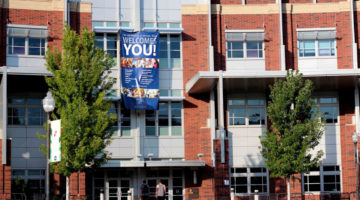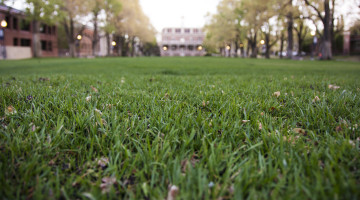
Daniel Lang/Nevada Sagebrush
Jhony Habbouche works in the Harry Reid Engineering Laboratory on Thursday, March 10. Habbouche took the opportunity to study abroad in the U.S. and has made the best out of it.
“I threw behind me 23 years, and I came [to Nevada],” said Jhony Habbouche, a Lebanese graduate student at the University of Nevada, Reno. “I have to start from zero. … Everything is new.”
Habbouche, 25, was born in Saudi Arabia and raised in Lebanon. He graduated in the top 10 of Lebanon’s civil engineering students before coming to the United States.
Two years ago, Habbouche arrived at the UNR to pursue an opportunity to study in the United States that he would not have received in Lebanon.
In Lebanese public education, students take a national test to determine programs of study. High school culminates in college entrance exams to vie for scarce seats in each field. His area, civil engineering, admitted fewer than 10 percent of applicants.
Private education in Lebanon, bypassing academic competition, is tremendously expensive – $35,000 per year, Habbouche calculated.
“My dad told me, ‘We can … sell part of our property. … Do it if you’d like,’” Habbouche said.
Neither of Habbouche’s parents finished their high school education.
Still, Habbouche bet on the exam.
From his culture, he knew what awaited — more than eight hours of study per day for weeks.
Habbouche’s resolve reaped success. To his amazement, he ranked ninth in the field and was accepted to Lebanese University — Faculty of Engineering, Branch Two.
“At the end … I say thank you, God. But there’s always room for improvement,” Habbouche said.
Four years later, he petitioned his chairman for lab experience abroad.
Dr. Elie Hajj of UNR offered placement for a fully funded graduate program, but in pavement/materials, outside Habbouche’s interest in the field of structural engineering.
Habbouche had no ties in the U.S. except Hajj, who graduated from Lebanese University 16 years before.
Despite his reluctance, Habbouche realized thousands of students wait for such an offer, so he accepted.
Habbouche has experienced several hardships since making the choice to accept the offer to study abroad.
“‘You should be a terrorist,’” Habbouche recalled people saying. “I used to take it [as a] kind of funny comment, but seriously it hurts.”
It was through the Catholic Church at Our Lady of Wisdom that he found peace among the difficulties he experienced.
“They made me feel that I am one of them,” Habbouche said.
Inside and outside studies, Habbouche serves and helps his colleagues — sometimes when he should be more focused on his own studies, according to Hajj. Habbouche says part of it comes from his culture and a passion for “human relations.”
“Very few students, they have that kind of personality,” Hajj said.
“Everyone … can provide something,” Habbouche said. “They just have to never underestimate themselves and to work hard.”
Habbouche aims to earn his doctorate by spring 2019.











